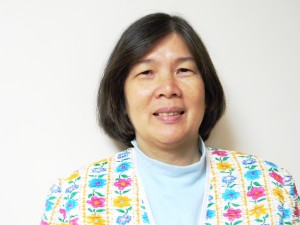Current Mission Location – Japan
Margaret Lacson was born January 1, 1956 to Cecilia (Lizares) Lacson and German D Lacson in Bacolod Cit, Negros Occidental, Philippines. She was the 10th of seventeen children: 6 sisters and 9 brothers. Margaret graduated from St. Scholastica Academy, Bacolod City in 1974.
Margaret always felt the deep influence of her faith, both as a child and throughout her life. After being educated by the Benedictine Sisters from grade school through college, she received a Bachelor of Music in Piano from St. Scholastica College in Manila in 1980 and taught music for several years at St. Scholastica Academy. At 27, she decided to enter the Maryknoll Sisters after working as a secretary and editor of the Ecumenical Association of Third World Theologians (EATWT) and coming into contact with the Maryknoll Sisters for the first time. She recalls being moved by the Maryknoll efforts of working “not only for the liberation of the country but of the women, as well.”
Margaret entered the Maryknoll Sisters at their Center in New York August 25, 1990. She pronounced her First Vows on August 15, 1992 at the Center and was assigned to Japan in 1993. She pronounced Final Vows May 30, 1999 in Japan.
After completing a language course in Tokyo, she spent her first several years in Kyoto, volunteering in after-school activities for children coming to KiboNo Le. In 1995, she relocated to Kamakura, Yokohama, the most populous region of Japan. There, she worked to empower battered women at a Catholic relief shelter and, after a period of renewal, ministered to pastoral migrants from the Philippines.
She also worked for Action in Asia, an organization dedicated to exposing social injustices, particularly to foreign audiences, and developed an interfaith connection between Christianity and Buddhism at San Un Zenso with Zen practice.
In 2002, she became one of the founding members of the Kalakasan Migrant Women Empowerment Center, which works to stabilize foreign women and their children in Japanese communities. In Tagalog, one of the main native languages of the Philippines, kalakasan means “strength”; as such, its activities are many and focused on empowerment. Its ministries include hosting a crisis intervention program, follow-up care for abused women, networking for improvement in the legal status of migrants and women, and administering a babysitting cooperative for single Filipina mothers, among many others. She has described her work as helping both children and adults “learn to know and love themselves as part-Filipino” in a foreign country. Furthermore, she has also been involved in anti-trafficking movements, to which organizations such as Kalakasan contribute. She continues her work in Japan.

